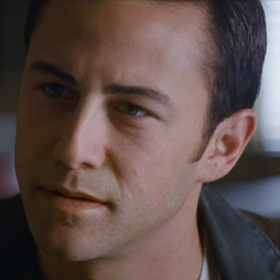'Looper' Comes Full Circle

5/5
Best served with as little prior knowledge before viewing as possible, Looper is a gem in large part because of its marketing campaign, which teased out only small bits of the premise — what happens if you are charged with killing your future self? — and left the rest of the storytelling for the actual movie. The film itself ignores dense exposition that could easily bog the story down, favoring a quick and dirty explanation of time travel and its use in the future: “Time travel has not yet been invented, but 30 years from now it will have been.”
Writer/director Rian Johnson frees up the rest of the film to focus on the story at hand, that of a young man named Joe (Joseph Gordon-Levitt) in the year 2044 who works as a looper, a contract killer responsible for killing people sent back in time (from 2074) by criminal mobs. The job seems pretty easy; Joe waits in a field for a man bound, gagged, and hooded to appear, and he shoots him on the spot. The difficulty with being a looper, however, comes when you are asked to kill your future self, as all loopers are eventually retired in the future. We briefly see what happens when one looper fails to “close the loop,” and thus understand why young Joe is so desperate when he allows his own future self (Bruce Willis) to escape early on in the film.
The near future in Looper looks, for the most part, like modern day. The are still cities that are crowded and grimy, and farms that are vast and isolated. Rather than re-envisioning the entire future, Johnson introduces small details, such as the occasional floating motorcycle and the credit card-sized cell phones. And Johnson’s quick cuts and dry humor make this depressing future bearable and exciting to witness. Johnson’s script also has fun with the notion of how time travel affects the present and future self, and we explore these issues through the intriguing notion of how memories are formulated and sustained as well as how, in one of the film’s most indelible and gruesome scenes, physical transformations on the present self take shape in real time on the future self. Like a veteran athlete, Looper picks its spots when it wants to amaze, which helps make this patient film one of the best science fiction movies in recent memory, rather than an overdone trainwreck.
Working within this bleak realm, Johnson sets the stage for his performers to shine; Emily Blunt, as Sara, a farmer and single mother to her son, Cid, played masterfully by Pierce Gagnon, as well as Jeff Daniels as young Joe’s criminal boss, Abe, turn in strong and believable performances alongside Willis. Even Paul Dano, who is only featured for a short time as a haphazard looper named Seth, deserves recognition for maximizing his screen time. But this show belongs to Gordon-Levitt.
Perhaps the definitive moment in Looper comes during a standoff in a lowly diner between Gordon-Levitt and Willis. Exchanging barbs about their respective ages, Willis’ old Joe hunches forward on the table, while Gordon-Levitt slowly leans back, tilts up his head, squints his eyes and purses his lips in a perfect impersonation of Joe’s future self. At this point you may find yourself more drawn to the guy playing Willis than Willis himself; the kid from 3rd Rock From the Sun literally steals the show from John McClane himself. And while your mind will surely be puzzled by Willis’ statement, “Yesterday is 30 years from now,” there is no doubt that whether it’s the past, present or future, this is most certainly Joseph Gordon-Levitt’s time.
RELATED ARTICLES
Get the most-revealing celebrity conversations with the uInterview podcast!





Leave a comment